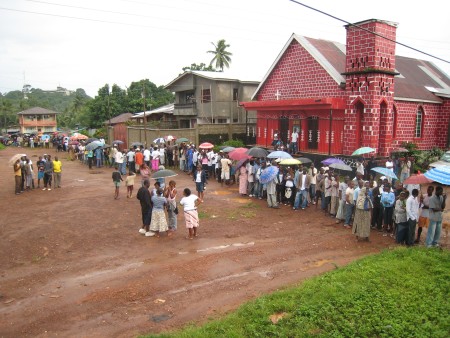By Ade Daramy – Traditionally, Independence and National days are times for celebration. They can also be times for reflection as citizens of independent nations take stock of challenges and achievements since independence.

It is said that even out of adversity, good can come. The last year or so, leading up to 55th anniversary commemorations in Sierra Leone are a case in point. As Sierra Leone prepares to commemorate 55 years of independence, there will of course, be many opportunities for celebration, unavoidably, the events marking this year’s auspicious anniversary are tinged with reflection and sadness.
The scourge of Ebola, which ripped through the country and in 2014 and 2015 left, in its wake, a different country by the time the pandemic was declared over.
Sierra Leoneans have always been known as a nation that knew how to throw a party. However, the advent of Ebola mean that the most innocent of pastimes, going out and having fun, suddenly took on a sinister edge; the most basic instruction was for people to ‘avoid all bodily contact’ (ABC, as some folks referred to it). Bars and restaurants that had been heaving suddenly, for several months, were empty.
As the nation rebuilds after Ebola, it has become clear that, although the health sector was exposed as lacking, other aspects of the country’s socio-economic landscape needed an overhaul.
One of the greatest aspects of the crisis was that it showed how the Sierra Leone Diaspora could come together in a way hitherto unforeseen.
Sierra Leone Diaspora communities in the UK, USA, Germany, France and the Netherlands, all contributed, either in increasing their already considerable remittances or in targeting remittances at humanitarian efforts.
In the UK, as Ebola ravage Sierra Leone, it was clear that, in addition to international efforts to combat the outbreak, there was a significant role and contribution the Sierra Leone Diaspora could make. The Sierra Leone UK Ebola Response Taskforce (SLUKDERT) was formed in response to the outbreak and includes a wide spectrum of Diaspora Sierra Leoneans, organised a meeting in partnership with EngAyde (another Sierra Leone Diaspora organisation) in an effort to bring a sense of togetherness and act as a facilitator for cooperation between UK-based Diaspora organisations.
The London event, in November 2014, sought to foster constructive dialogue and stronger coordination in the Diaspora response to the Ebola crisis. It also wanted to enhance existing information sharing systems relating to Ebola.
The impromptu ‘umbrella organisation’, the Sierra Leone Diaspora Ebola Response Taskforce (SLUKDERT), gave attendees to the initial and subsequent meetings opportunities to share their responses to the Ebola crisis and highlight the key activities of the taskforce and its specific operational projects – I.e. the HR roadshow (for those organisations recruiting volunteers to go to Sierra Leone and join the efforts to combat the disease) and the shipment of 10 containers of medical equipment, amongst other activities.
In the end, participants were able to look at practical inexpensive and simple steps that could be implemented immediately to enhance their response to the Ebola crisis and provide networking opportunities to share best practice.
It is probably true to say, the crisis fostered a sprit of collaboration among Sierra Leonean organisations that no other crisis or event had previously managed to achieve.
The Sierra Leone diaspora is traditionally made up of faith groups, alumni and district descendants associations, as well as many other types of affiliate organisations. Usually, these groups plough their own furrow, rarely to cooperate.
Attendees were encouraged to look at how they could contribute by addressing three main aspects of the Diaspora’s reaction: (1) challenges they face as individuals or members of organisations, (2) lessons learned from those challenges and (3) how they could contribute particularly by collaborating with fellow Sierra Leoneans or friends of Sierra Leone with shared interests.
It is no exaggeration to say that the meetings in the UK and USA seemed to awaken a sense of patriotism in many Sierra Leoneans that went way beyond just feeling good about one’s country; people wanted to get involved in giving something back or doing something to make a difference.
Looking forward, many groups resolved to collaborate in the areas of health, education, business, engineering and other sectors in the rebuilding of the nation.
As well as looking forward, we may also take an opportunity to look back on some of the significant historical events that have happened in the life of the country.
In that spirit, let us remember some of these:
- 1808 – Sierra Leone becomes a British Crown Colony;
- 1895 – Sir Samuel Lewis, a Sierra Leonean, becomes the first African to be knighted;
- 27 September 1961 – Sierra Leone was admitted as the 100th member of the United Nations;
- 9 February 1964 – Sierra Leone issued the world’s first ever self-adhesive stamps;
Sierra Leone Facts and figures:
Population: 5,879,098 (July 2015 estimate) – Natural resources: diamonds, titanium ore, bauxite, iron ore, gold, chromite
Maternal mortality rate: 1,360 deaths/100,000 live births (2015 est.)
country comparison to the world: (5th worst)
Infant mortality rate:
- total: 68 deaths/1,000 live births
- male: 14 deaths/1,000 live births
- female: 96 deaths/1,000 live births (2015 est.)
Country comparison to the world:
Life expectancy at birth:
- total population: 58.3 years
- male: 3 years
- female: 2 years (2015 UN est.)
country comparison to the world:
Literacy rate: Definition: age 15 and over can read and write English or Arabic
- total population: 1%
- male: 7% / female: 37.7% (2015 est.)










